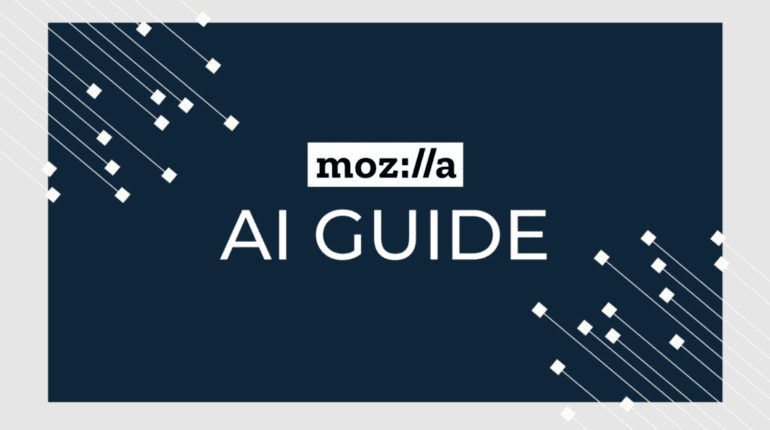TL;DR:
- Mozilla introduces the AI Guide, a community-driven resource for developers to explore AI innovations.
- The guide empowers developers with a choice between open-source and big tech solutions.
- Mozilla commits $30 million to establish Mozilla.ai, a startup focused on trustworthy, open-source AI.
- The Responsible AI Challenge and Fakespot highlight Mozilla’s dedication to ethical AI.
- The AI Guide covers AI basics, language models, and interactive ML model selection.
- Notable projects in the guide offer inspiration and insights.
- Future sections will delve into data retrieval, image modeling, and fine-tuning.
- The AI Guide encourages developer contributions and collaboration.
Main AI News:
In a significant stride towards fostering innovation and transparency in the field of artificial intelligence, Mozilla, the renowned advocate for an open web, has unveiled its latest initiative – the Mozilla AI Guide. This community-driven resource is poised to serve as the developers’ ultimate onboarding ramp to the dynamic world of generative AI innovations. In an era where AI technology is rapidly evolving, the AI Guide embodies Mozilla’s commitment to empowering developers with choices between open-source solutions and alternatives offered by tech giants.
The Launch of the AI Guide: Empowering Developer Choice
Mozilla’s ambition with the AI Guide is resoundingly clear: it seeks to provide developers with a platform that transcends the boundaries of the fragmented open-source AI community. The AI Guide aims to curate a more accessible and transparent AI space, enabling developers to engage in the creation of innovative and trustworthy technology.
According to Imo Udom, Senior Vice President of Innovation Ecosystems at Mozilla, “Mozilla’s efforts in AI are more than just technical – they’re a call to action and unity across the currently fragmented open-source AI community. We created the AI Guide with the ethos of curating a more accessible and transparent AI space to support developers interested in building innovative and trustworthy technology.”
A Legacy of Digital Empowerment
With a legacy spanning over a quarter-century, Mozilla has consistently championed user-first innovations, from the Firefox browser to the Mozilla VPN. The launch of the AI Guide is yet another testament to Mozilla’s commitment to digital empowerment. Mozilla’s journey into responsible AI began with the Mozilla Foundation’s pioneering work in the trustworthy AI space, highlighting its dedication to ethical AI practices.
Investing in the Future of AI
In a bold move, Mozilla has allocated $30 million to establish Mozilla.ai, a startup focused on building a trustworthy, independent, and open-source AI ecosystem. This substantial investment reflects Mozilla’s dedication to advancing AI technologies responsibly. Additionally, Mozilla’s commitment to responsible AI was underscored by its hosting of the first Responsible AI Challenge, challenging developers to design and defend responsible and trustworthy AI solutions for various industries.
Adding to its AI portfolio, Mozilla introduced Fakespot, a product that leverages AI to detect patterns among reviews and distinguish real from fake reviews. This strategic addition further exemplifies Mozilla’s commitment to enhancing user experiences and safeguarding online communities.
Navigating the AI Guide
The Mozilla AI Guide comprises several sections that cater to developers’ most pressing questions about large language models (LLMs). These sections include:
- AI Basics: Delving into the fundamental concepts of AI, machine learning (ML), and large language models (LLMs), this section provides readers with a shared baseline understanding. It offers insights into the pros and cons of using LLMs and presents visual aids for clarity.
- Language Models: Building on the foundation of AI basics, this section explores more advanced topics, answering questions like “What does ‘training’ an ML model mean?” and “What is a ‘human in the loop’ approach?” It also delves into the concept of “temperature” in AI.
- Choosing Machine Learning Models: Here, developers can put their newfound knowledge into practice using interactive tools and exercises in Google Colab notebooks. This section aims to make AI more accessible by simplifying complex terminology and fostering hands-on learning.
- Notable Projects: Highlighting innovative initiatives from the AI community, this section showcases projects ranging from front-end solutions to complete LLM solutions. These handpicked projects offer inspiration and valuable insights into AI innovation.
- Future Expansion
Mozilla has ambitious plans to expand the AI Guide with additional sections over the coming months, covering topics such as “Data Retrieval,” “Image Modeling,” and “Fine Tuning.” This ongoing commitment to development ensures that the AI Guide remains a dynamic and comprehensive resource for developers.
A Community-Driven Resource
Mozilla recognizes the indispensable role of the developer community in shaping responsible AI technology. The AI Guide is envisioned as a collaborative, community-driven resource where developers can come together to pioneer and drive generative AI innovations.
Imo Udom emphasized, “Our vision for the AI Guide is to be the starting point that every developer can revisit for clarity and inspiration, ensuring that AI innovations enrich everyday life.” Developers are encouraged to contribute to the AI Guide, making it a repository of collective knowledge and expertise. Mozilla welcomes contributions in various forms, including open-source AI projects, implementations, videos, audio models, and learning resources.

Developers’ top questions answered. Source: https://blog.mozilla.org/
Conclusion:
Mozilla’s AI Guide signifies a strategic move towards nurturing responsible AI innovation while promoting transparency and community collaboration. The $30 million investment in Mozilla.ai and initiatives like the Responsible AI Challenge demonstrate a commitment to shaping the future of AI in a responsible manner. This development could potentially catalyze the growth of the open-source AI ecosystem and encourage more ethical AI practices in the market.

